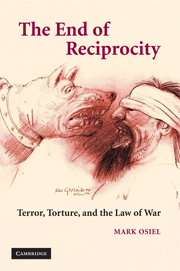Book contents
- Frontmatter
- Contents
- Introduction
- PART ONE RECIPROCITY IN HUMANITARIAN LAW
- PART TWO THE ETHICS OF TORTURE AS RECIPROCITY
- PART THREE RECIPROCITY IN THE SOCIAL SCIENCE OF WAR
- 8 Reciprocity as Civilization: The Terrorist as Savage
- 9 The Inflationary Rhetoric of Terrorist Threat: Humanitarian Law as Deflationary Check
- 10 Reciprocity as Tit-for-Tat: Rational Retaliation in Modern War
- 11 The “Gift” of Humanitarianism: Soft Power and Benevolent Signaling
- PART FOUR THE END OF RECIPROCITY
- Conclusion
- Acknowledgments
- Notes
- Index
10 - Reciprocity as Tit-for-Tat: Rational Retaliation in Modern War
Published online by Cambridge University Press: 05 June 2012
- Frontmatter
- Contents
- Introduction
- PART ONE RECIPROCITY IN HUMANITARIAN LAW
- PART TWO THE ETHICS OF TORTURE AS RECIPROCITY
- PART THREE RECIPROCITY IN THE SOCIAL SCIENCE OF WAR
- 8 Reciprocity as Civilization: The Terrorist as Savage
- 9 The Inflationary Rhetoric of Terrorist Threat: Humanitarian Law as Deflationary Check
- 10 Reciprocity as Tit-for-Tat: Rational Retaliation in Modern War
- 11 The “Gift” of Humanitarianism: Soft Power and Benevolent Signaling
- PART FOUR THE END OF RECIPROCITY
- Conclusion
- Acknowledgments
- Notes
- Index
Summary
MILITARY HISTORY THROUGH THE LENS OF SOCIAL SCIENCE
To answer convincingly this book's policy questions, we must first ask a more elemental empirical one: Do the Geneva Conventions really contribute much to restraint in war, to better treatment of enemy soldiers and civilians? Or, do the Conventions merely coordinate relations among states with preexisting cooperative interests, having no independent effect on their behavior? Claims that relaxing legal restraints on combating terrorists will have dire consequences for human protection assume that these restraints have been effective. Yet how different would the last century's history of warfare have been if there had been no Hague or Geneva Conventions? These questions presume that, when engaged in practical moral reasoning, we need to take consequences seriously, including consequences that are unintended but foreseeable.
Restraint in war has many sources in addition to those imposed by law. How important is the law, really, when compared to these other sources? There has always been intermittent evidence throughout military history for what might be called a sociology of martial restraint. In early modern Europe, historian Geoffrey Parker observes, especially at the local level,
Where garrisons from opposing sides existed in close proximity, conventions emerged that anticipated the live and let live system on relatively quiet sectors of the trenches on the western front during World War I.…In order to remove the intolerable tensions of living on permanent alert, rival garrison commanders or neighboring (but opposed) communities would agree not to attack each other. There was even a ratchet effect, as cooperation on such basic matters led to deals in other areas, such as where each side might safely forage.[…]
- Type
- Chapter
- Information
- The End of ReciprocityTerror, Torture, and the Law of War, pp. 264 - 295Publisher: Cambridge University PressPrint publication year: 2009

